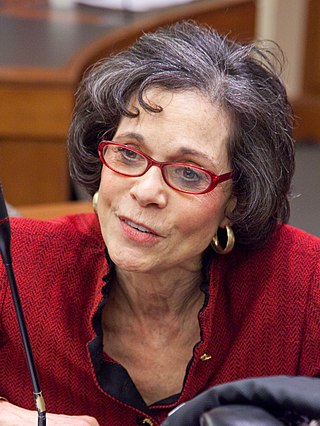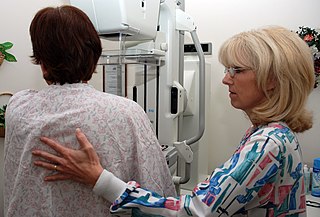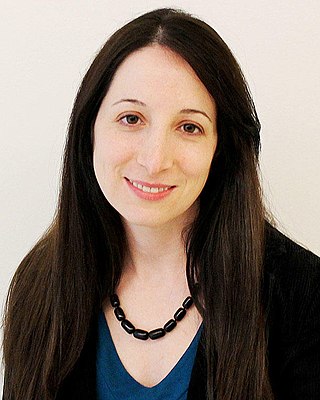Related Research Articles

Cancer is a group of diseases involving abnormal cell growth with the potential to invade or spread to other parts of the body. These contrast with benign tumors, which do not spread. Possible signs and symptoms include a lump, abnormal bleeding, prolonged cough, unexplained weight loss, and a change in bowel movements. While these symptoms may indicate cancer, they can also have other causes. Over 100 types of cancers affect humans.

Roxana Moslehi is an Iranian-born genetic epidemiologist.

Devra Lee Davis is an American epidemiologist, toxicologist, and author of three books about environmental hazards. She was founding director of the Center for Environmental Oncology at the University of Pittsburgh Cancer Institute, and is a former professor of epidemiology at University of Pittsburgh Graduate School of Public Health. She has served on several governmental and non-governmental organizations, conducting research and advocacy into effects of pesticides, asbestos, and wireless radiation on human health, especially cancers.
Inge Schmitz-Feuerhake is a German physicist and mathematician. Her research has assessed the biological effects of ionizing radiation at low dosage levels. From 1973 and until her retirement in 2000 she was a professor in experimental physics at the University of Bremen. Much of her research concerned the areas of radiation contamination and the effect of low level radiation exposure, as well as the diagnostic use of nuclear radiation.

The objective of cancer screening is to detect cancer before symptoms appear, involving various methods such as blood tests, urine tests, DNA tests, and medical imaging. The purpose of screening is early cancer detection, to make the cancer easier to treat and extending life expectancy. In 2019, cancer was the second leading cause of death globally; more recent data is pending due to the COVID-19 pandemic.
Irva Hertz-Picciotto, is an environmental epidemiologist best known for her studies of autism. She is Professor and Chief, Division of Environmental and Occupational Health, Department of Public Health Sciences, at the University of California, Davis (UC-Davis). In addition, she is on the Research Faculty of the MIND Institute at UC-Davis; is Deputy Director of the UC-Davis Center for Children's Environmental Health; and is on the faculty of the Center for Occupational and Environmental Health of the Universities of California at Berkeley, Davis, and San Francisco. Hertz-Picciotto serves on the advisory board of the anti-toxic chemical NGO Healthy Child, Healthy World.

Nilanjan Chatterjee is a Bloomberg Distinguished Professor of Biostatistics and Genetic Epidemiology at Johns Hopkins University, with appointments in the Department of Biostatistics in the Bloomberg School of Public Health and in the Department of Oncology in the Sidney Kimmel Comprehensive Cancer Center in the Johns Hopkins School of Medicine. He was formerly the chief of the Biostatistics Branch of the National Cancer Institute's Division of Cancer Epidemiology and Genetics.

Calvin Zippin is a cancer epidemiologist and biostatistician, and Professor Emeritus in the Department of Epidemiology and Biostatistics at the University of California School of Medicine in San Francisco (UCSF). He is a Fellow of the American Statistical Association, the American College of Epidemiology and the Royal Statistical Society of Great Britain. His doctoral thesis was the basis for the Zippin Estimator, a procedure for estimating wildlife populations using data from trapping experiments. He was a principal investigator in the Surveillance, Epidemiology, and End Results (SEER) program of the National Cancer Institute (NCI) which assesses the magnitude and nature of the cancer problem in the United States. In 1961, he created training programs for cancer registry personnel, which he conducted nationally and internationally. He carried out research on the epidemiology and rules for staging of various cancers. He received a Lifetime Achievement and Leadership Award from the NCI in 2003.
Jill Wruble is a radiologist and fellow at Johns Hopkins Medicine who is best known as a speaker on overdiagnosis due to incidental imaging finding in United States medicine.
Ethel S. Gilbert is an American biostatistician and an expert in the risks of radiation-induced cancer, including cancers in nuclear workers and second cancers in radiation therapy patients.

Amy Berrington de González is a scientist. She is a senior investigator and radiation epidemiology branch chief at the National Cancer Institute.

Elizabeth Khaykin Cahoon is a Georgian-born American epidemiologist researching cancer and precancer risks conferred by environmental sources of radiation exposure. She is a Stadtman investigator at the National Cancer Institute.
Diana S.M. Buist is an American epidemiologist. She is a senior investigator and director of research and strategic partnerships at Kaiser Permanente Washington Research Institute.
Rachel A. Whitmer is an epidemiologist at the University of California, Davis. Whitmer is a professor in the UC Davis Department of Public Health Sciences and chief of the UC Davis Division of Epidemiology. She also works with Kaiser Permanente. Whitmer received her undergraduate degree from the University of Massachusetts Amherst, and her PhD from UC Davis.

Xiaohong Rose Yang is an American biomedical scientist researching the genetics of dysplastic nevus syndrome and chordoma, and etiologic heterogeneity of breast cancer. She is a senior investigator at the National Cancer Institute. Yang leads breast cancer studies in mainland China, Hong Kong, and Malaysia.
Rebecca Allana Hubbard is an American biostatistician whose research interests include observational studies and the use of electronic health record data in public health analysis and decision-making, accounting for the errors in this type of data. She is a professor of biostatistics in the Perelman School of Medicine at the University of Pennsylvania.

Katrina A. Blouke Goddard is an American genetic epidemiologist and biostatistician specializing in public health genomics and the translation of genomic applications into clinical practice. Goddard is the director of the division of cancer control and population sciences (DCCPS) at the National Cancer Institute (NCI). She was previously the distinguished investigator and director of translational and applied genomics at the Kaiser Permanente Center for Health Research and a faculty member at Case Western Reserve University.

Julia C. Gage is an American cancer epidemiologist who researches cervical screening and the human papillomavirus infection. She is a staff scientist in the clinical genetics branch at the National Cancer Institute.

Aimée Rebecca Kreimer is an American cancer epidemiologist who researches the etiology and prevention of human papillomavirus infection (HPV) and cancer prevention. She is a senior investigator in the infections and immunoepidemiology branch at the National Cancer Institute.

Nancy Ann Potischman is an American nutritional epidemiologist known for her research at the National Cancer Institute and the National Institutes of Health's Office of Dietary Supplements (ODS). She was director of the ODS population studies program from 2016 to 2023.
References
- ↑ O'Connor, Matt (19 February 2021), "'We're going in the wrong direction': Race, income, education impeding women's access to DBT", HealthImaging
- ↑ Brody, Jane E. (17 August 2020), "Are Mammograms Worthwhile for Older Women?", Personal health, The New York Times
- 1 2 Why does Diana Miglioretti study the biostatistics of cancer screening?, Kaiser Permanente Washington Health Research Institute, 13 November 2018, retrieved 2021-05-10
- ↑ "Making a safe procedure even safer: Simple refinements could reduce radiation risk from digital screening mammography", EurekAlert!, American Association for the Advancement of Science, 2016
- ↑ Carroll, Linda (10 June 2013), Multiple CT scans in kids linked to later cancer risk, NBC News
- ↑ Nguyen, Brandon (7 May 2021), "UC Davis Health discovers increased risk of leukemia in children with Down syndrome", The California Aggie
- 1 2 "Diana Miglioretti honored with national award for her translational work on breast cancer screening", Newsroom, UC Davis Health, 17 April 2020, retrieved 2021-05-10
- ↑ "Diana L. Miglioretti, Ph.D.", Our Team, UC Davis Health, retrieved 2021-05-10
- ↑ Diana Miglioretti at the Mathematics Genealogy Project
- ↑ 1999–2000 PhD Alumni, Biostatistics, Johns Hopkins Bloomberg School of Public Health, retrieved 2021-05-10
- 1 2 "Ph.D. Diana MIGLIORETTI", Who is who, European Forum Alpbach, retrieved 2021-05-10
- 1 2 3 "New chief for biostatistics", Health news, UC Davis Health, 5 September 2019, retrieved 2021-05-10
- ↑ ASA Fellows list, American Statistical Association, retrieved 2021-05-10